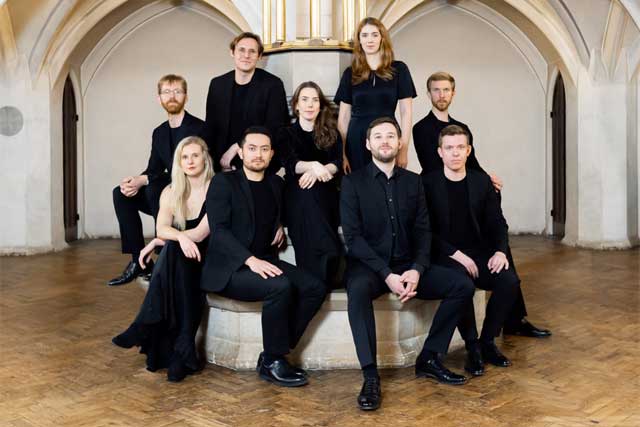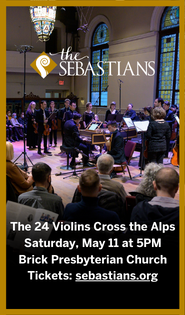Marian Consort explores the luminous music of Lusitano
Music Before 1800’s Sunday afternoon concert at Corpus Christi church was a sparkling example of how to present and perform music that’s hundreds of years old as not just a beautiful object but a living thing with a social, as well as musical, history.
Making their New York City debut was the eight-voice Marian Consort, conducted by Rory McCleery. The program was centered around liturgical vocal music by Vicente Lusitano, set in the context of his peers and his professional milieu in mid-16th-century Rome. In a program with thirteen works from seven composers, six of them were by Lusitano, and all were lovely and luminous.
Lusitano is not an unknown figure, but is obscure enough that his full identity is a mystery. As McCleery wrote in his informative program notes, the composer was called “Lusitano” because he came to Rome from Portugal—a subtext of the program was how Iberian style might have changed by the aesthetic demands of the church.
The Consort opened with his Heu me, Domine, a scintillating work. Lusitano set the text, which is confessional and beseeching, to a series of rising chromatic scales that repeat and move in canon. Not just extremely stylish, skillful and piquantly expressive while still following liturgical demands, the music has a startling sense of personal freedom and daring that puts to shame a lot of contemporary composing.
This was a succinct calling card for Lusitano, as well as the Marian Consort. Everything was wonderfully sung. The Consort stood out from the crowd of superb vocal ensembles though their balanced mix of individual timbres, colors and grains connected with exact intonation and dynamics. They had what seemed an ideal combination of ensemble and individuality, like Lusitano himself.
The composer’s panache seems to have worked both ways, influencing those around him but also marginalizing him. McCleery wrote that “we can…be reasonably confident that he is the first published Black computer,” and implied in one of his brief spoken introductions that the non-musical issue of race had something to do with Lusitano’s obscurity.
The music argued for this. One of the most famous moments in his career was a debate on chromaticism in liturgical music between himself and Nicola Vicentino. Lusitano won this, and one of the judges, Ghiselin Danckerts, was represented on the program with his finely made Laetimini in Domino, which came second. The Consort then sang Lusitano’s Regina caeli, a gorgeous, soaring piece that was a central part of the debate.
This was following by Vicentino’s Heu mihi Domine, itself highly imitative of Lusitano, as chromatic if a little less individual. Yet in history it was Vicentino’s supposed innovations, cribbed from Lusitano, that became a codified influence in 16th Century polyphony. The ostensible loser became the winner, seemingly because of the latter’s social status. La plus ça change…
The rest of the first half, and the whole remaining concert, showcased Lusitano with peers like Palestrina (Regina caeli a8), and his younger contemporary from the Iberian peninsula, Victoria, via his gorgeous Ave Maria a8. The Consort showed that Lusitano and Victoria had the same general idea of style, the music of both swelling and expanding in space while seeming to hold still in time, and the performances revealed Lusitano as equal to his more famous peers.
In an interesting contrast, the Consort also sang music from Portuguese composers Dom Pedro de Cristo and João Lourenço Rebelo. The former works were square and inert, the latter there to show Lusitano’s influence. The main effect was to reinforce that the finest artists made their way to Rome, and even if he may have been placed at the margins, Lusitano’s music is eternal.
Music Before 1800 present “Mali Before 1800,” 4 p.m. Sunday, March 24. mb1800.org








